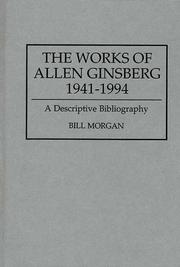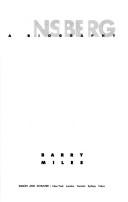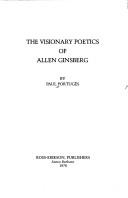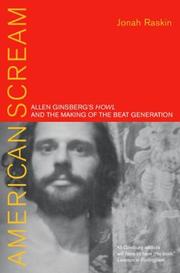| Listing 1 - 6 of 6 |
Sort by
|

ISBN: 0313293899 Year: 1995 Volume: 19 Publisher: Westport (Conn.): Greenwood
Abstract | Keywords | Export | Availability | Bookmark
 Loading...
Loading...Choose an application
- Reference Manager
- EndNote
- RefWorks (Direct export to RefWorks)
012 GINSBERG, ALLEN --- Beat generation --- -Beat generation --- Beatniks --- Beats --- American literature --- Bohemianism --- Bibliografie van bepaalde auteur--NAAM--GINSBERG, ALLEN --- Bibliography --- Ginsberg, Allen --- -Bibliography --- 012 GINSBERG, ALLEN Bibliografie van bepaalde auteur--NAAM--GINSBERG, ALLEN --- -Bibliografie van bepaalde auteur--NAAM--GINSBERG, ALLEN --- Persons --- Ginsberg, Allen, --- Ginzberg, Alen, --- Gīnasabārga, Ayālena, --- Ginsberg, Irwin Allen, --- גינזברג, אלן --- Bibliography. --- Ginsberg, Allen, - 1926- - Bibliography.

ISBN: 0671507133 Year: 1980 Publisher: New York (N.Y.) Simon and Schuster
Abstract | Keywords | Export | Availability | Bookmark
 Loading...
Loading...Choose an application
- Reference Manager
- EndNote
- RefWorks (Direct export to RefWorks)
820 "19" GINSBERG, ALLEN --- Poets, American --- -Beat generation --- Beatniks --- Beats --- American literature --- Bohemianism --- American poets --- 820 "19" GINSBERG, ALLEN Engelse literatuur--20e eeuw. Periode 1900-1999--GINSBERG, ALLEN --- Engelse literatuur--20e eeuw. Periode 1900-1999--GINSBERG, ALLEN --- Biography --- Ginsberg, Allen --- Beat generation --- Persons --- Ginsberg, Allen, --- Ginzberg, Alen, --- Gīnasabārga, Ayālena, --- Ginsberg, Irwin Allen, --- גינזברג, אלן --- Poets [American ] --- 20th century

ISBN: 0915520176 Year: 1978 Publisher: Santa Barbara Ross-Erikson
Abstract | Keywords | Export | Availability | Bookmark
 Loading...
Loading...Choose an application
- Reference Manager
- EndNote
- RefWorks (Direct export to RefWorks)
Beat generation --- Poetics --- Poetry --- Poets, American --- Visions in literature --- Authorship --- Beatniks --- Persons --- Bohemianism --- Interviews --- History --- Blake, William, --- Ginsberg, Allen, --- Ginzberg, Alen, --- Gīnasabārga, Ayālena, --- Ginsberg, Irwin Allen, --- גינזברג, אלן --- Blake, W. --- Blake, William --- Blake, William, 1757-1827 --- Bleĭk, Uilʹi︠a︡m, --- בליק, ויליאם, --- בלייק, ויליאם, --- Influence. --- Aesthetics. --- Interviews. --- Ginsberg, Allen
Book
ISBN: 1282776959 9786612776953 1443824763 9781443824767 9781443824163 144382416X 9781282776951 6612776951 Year: 2010 Publisher: Newcastle upon Tyne Cambridge Scholars Pub.
Abstract | Keywords | Export | Availability | Bookmark
 Loading...
Loading...Choose an application
- Reference Manager
- EndNote
- RefWorks (Direct export to RefWorks)
Kerouac Ascending: Memorabilia of the Decade of ON THE ROAD is a memoir written by Elbert Lenrow about his relationship with Jack Kerouac, whom he taught at the New School in NewYork when Jack was emerging as a writer and with Allen Ginsberg, both of whom Lenrow befriended and encouraged. Lenrow writes with sympathy and charm about both writers and their "beat" friends, revealing Kerouac's seriously academic side by sharing papers he wrote in his course and giving insight about both writers t...
Authors, American --- Beats (Persons) --- Beat generation --- Beatniks --- Persons --- Bohemianism --- Ginsberg, Allen, --- Kerouac, Jack, --- Lenrow, Elbert, --- Kerouac, Jack --- Kerouac, John --- Kérouac, Jean Louis Lebris de --- Chia-lo-kʻo, Chieh-kʻo --- Keruak, Dz︠h︡ek --- Ḳeruʼaḳ, G'eḳ --- קרואק, ג׳ק, --- Ginzberg, Alen, --- Gīnasabārga, Ayālena, --- Ginsberg, Irwin Allen, --- גינזברג, אלן --- Friends and associates.
Book
ISBN: 0585321787 9780585321783 0872497984 Year: 1992 Publisher: Columbia : University of South Carolina Press,
Abstract | Keywords | Export | Availability | Bookmark
 Loading...
Loading...Choose an application
- Reference Manager
- EndNote
- RefWorks (Direct export to RefWorks)
Foster provides a survey of the four major Beat writers: Jack Kerouac, Allen Ginsberg, William S. Burroughs, and Gregory Corso. These writers were closely allied from the beginning of their careers and shared a particular vision of America, one which in turn defined much of their most celebrated work. They wrote in opposition to the materialistic, conformist culture they saw developing in postwar America, seeking through their fiction and poetry a way out of that world. Literature, as Foster demonstrates, allowed both writer and reader to see things as they were while, at the same time, providing an entry into transcendent realities. The best-known Beat works, On the Road, "Howl," and Naked Lunch, responded directly to social and political conditions at mid-century while indicating ways to escape them. Although the Beats were widely seen as social revolutionaries by journalists, Kerouac, Ginsberg, Burroughs, and Corso were always predominantly writers. As the United States moved away from the contained, conservative temperament of the postwar period, the Beats became celebrities, and, as such, were dependent for their reputations on newspapers, magazines, and television. Their fame assured that they would be read, yet they were perhaps better known for their values and their personalities than for their books. Confusing the writer with the subject of On the Road, Kerouac's early followers were surprised to find that he did not even like to drive. They failed to see that his real revolution had to do with language. Foster focuses on the problems of language and aesthetics that the Beats confronted and suggests to the reader the great range of influence their work has had on subsequent writers.
Beat literature --- Beats (Persons) --- American literature --- American Literature --- English --- Languages & Literatures --- Beat generation --- Beatniks --- Persons --- Bohemianism --- Literature --- History and criticism. --- History and criticism --- Kerouac, Jack, --- Burroughs, William S., --- Ginsberg, Allen, --- Ginzberg, Alen, --- Gīnasabārga, Ayālena, --- Ginsberg, Irwin Allen, --- גינזברג, אלן --- Burroughs, William S. --- Burroughs, William --- Lee, Willy --- Lee, William --- Baroouz, Ouiliam --- Berrouz, Uilʹi︠a︡m --- Kerouac, Jack --- Kerouac, John --- Kérouac, Jean Louis Lebris de --- Chia-lo-kʻo, Chieh-kʻo --- Keruak, Dz︠h︡ek --- Ḳeruʼaḳ, G'eḳ --- קרואק, ג׳ק, --- Criticism and interpretation. --- United States --- Intellectual life --- 20th century

ISBN: 0520240154 0520246772 9786612358272 0520939344 1282358278 159734463X 9780520939349 1417525320 9781417525324 9780520240155 9781282358270 6612358270 Year: 2004 Publisher: Berkeley, Calif. University of California Press
Abstract | Keywords | Export | Availability | Bookmark
 Loading...
Loading...Choose an application
- Reference Manager
- EndNote
- RefWorks (Direct export to RefWorks)
Written as a cultural weapon and a call to arms, Howl touched a raw nerve in Cold War America and has been controversial from the day it was first read aloud nearly fifty years ago. This first full critical and historical study of Howl brilliantly elucidates the nexus of politics and literature in which it was written and gives striking new portraits of Allen Ginsberg, Jack Kerouac, and William Burroughs. Drawing from newly released psychiatric reports on Ginsberg, from interviews with his psychiatrist, Dr. Philip Hicks, and from the poet's journals, American Scream shows how Howl brought Ginsberg and the world out of the closet of a repressive society. It also gives the first full accounting of the literary figures-Eliot, Rimbaud, and Whitman-who influenced Howl, definitively placing it in the tradition of twentieth-century American poetry for the first time. As he follows the genesis and the evolution of Howl, Jonah Raskin constructs a vivid picture of a poet and an era. He illuminates the development of Beat poetry in New York and San Francisco in the 1950s--focusing on historic occasions such as the first reading of Howl at Six Gallery in San Francisco in 1955 and the obscenity trial over the poem's publication. He looks closely at Ginsberg's life, including his relationships with his parents, friends, and mentors, while he was writing the poem and uses this material to illuminate the themes of madness, nakedness, and secrecy that pervade Howl.A captivating look at the cultural climate of the Cold War and at a great American poet, American Scream finally tells the full story of Howl-a rousing manifesto for a generation and a classic of twentieth-century literature.
Ginsberg, Allen --- Literature and mental illness --- Poetry --- Mental illness in literature. --- Beat generation. --- Insanity in literature --- Psychopathology in literature --- Authors, Insane --- Mental illness and literature --- Poets, Insane --- Beat generation --- Beatniks --- Persons --- Bohemianism --- History --- Psychological aspects. --- Ginsberg, Allen, --- Ginzberg, Alen, --- Gīnasabārga, Ayālena, --- Ginsberg, Irwin Allen, --- גינזברג, אלן --- Knowledge --- Psychology. --- 20th century. --- allen ginsberg. --- america. --- american culture. --- american poetry. --- american poets. --- american society. --- art and literature. --- beat generation. --- beat movement. --- beat poets. --- cold war america. --- controversial. --- critical analysis. --- cultural history. --- historical review. --- howl. --- jack kerouac. --- lit scholars. --- lit studies. --- literary criticism. --- literary figures. --- literary movements. --- modern poetry. --- new york. --- political literature. --- psychiatry. --- repressive society. --- san francisco. --- spoken word poetry. --- united states. --- walt whitman. --- william burroughs.
| Listing 1 - 6 of 6 |
Sort by
|

 Search
Search Feedback
Feedback About UniCat
About UniCat  Help
Help News
News